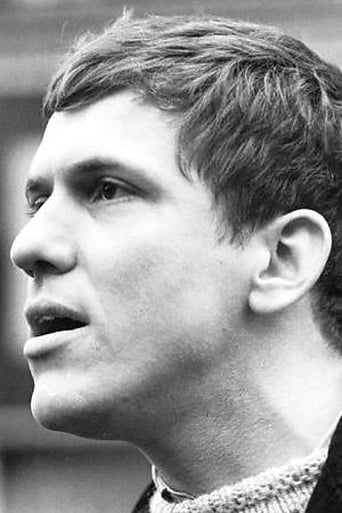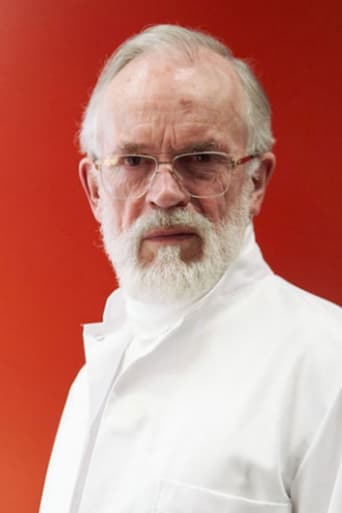BootDigest
Such a frustrating disappointment
Nessieldwi
Very interesting film. Was caught on the premise when seeing the trailer but unsure as to what the outcome would be for the showing. As it turns out, it was a very good film.
Helllins
It is both painfully honest and laugh-out-loud funny at the same time.
Donald Seymour
This is one of the best movies I’ve seen in a very long time. You have to go and see this on the big screen.
HuffingStardust
Slow to start, but beautifully done...the last obstruction makes all the difference. You have to get to the end before you can say anything about the film. It's well worth the subtitles. I suggest watching the film in segments, obstruction by obstruction because it is slow. It does all culminate, however, in quite a lovely way, by the end of the film. Also, you get to see the original film from 1967 at the end. The way the films are obstructed each time creates such new and different, but also exciting, interesting and valuable films that it's fascinating to watch. This is definitely an artsy film, and you will have to read subtitles unless you speak Dutch? I think it's dutch. Anyway, for film buffs it's a great time. If you're just an idiot with no attention span however, you will cry out of boredom at this film.
Framescourer
The film has two points of interest: the discussions between the two men as to what might constitute the limitations (the obstructions) - as good a way as any of discussing the content of the elusive original - and the behaviour of both men in the pursuit & rendition of the exercise.As a document that presents the perversity of the 'boardroom' pragmatism of film-making and its melodramatic content this is quite hard to beat. The five versions are satisfyingly varied, although we are not shown any in full as far as I can make out. Their relative value is of little importance; von Trier's final 'twist' obstruction doesn't really come off in fact although it may be seen to be the most likely to succeed. In this way we are also shown something of the pot luck of producing a good film.Above all though I came away trying to contain an imagination fomented on either side, both by the possibilities of the content of all six films (again, some more than others) and also by the auteur role; the possibilities and responsibilities faced when pointing a camera. And I'd always rather leave the theatre blinded with a brain bloated than a brain dead. 8/10
Claire Oscuro
Jorgen Leth and Lars von Trier's Five Obstructions is, in a certain sense, collaboration as confrontation. The restrictions von Trier places on Leth are designed to frustrate the latter's inclination to distance, stylization, and abstraction (tendencies antithetical to the naturalism, spontaneity, and transparency of the Dogme school), and at least one restriction ("complete freedom") is explicitly intended as punishment for Leth's too-loose interpretation of a previous directive. Belying this atmosphere of conspiratorial coercion is the documentary footage of the meetings between the two directors, where their interaction is friendly and warm, not to say giddy. But other footage of Leth when von Trier is absent shows the elder director as bleak, almost stunned. In this game of flip-flopping submission and dominance, von Trier insists that Leth lower his guard (or his standards) and produce the kind of work von Trier repeatedly describes as "crap." Von Trier's not interested in art, but in therapy, as he reveals in the banal Obstruction #5, in which black-and-white documentary footage of the making of the previous four Obstructions are set as an illustrative montage to the sound of Leth's voice reading a letter to him written by von Trier, which exposes with crude and merciless sentimentality Leth's struggle with depression and von Trier's crusade to save him through the making of this film. Von Trier's mission would appear to be self-defeating, inasmuch as the brilliant flashes of ecstatic engagement that Leth displays throughout the documentary footage all occur when he has, despite von Trier's traps, continued to produce the gorgeous and intelligent cinema for which he is renowned (most notably in the very first and very best Obstruction, filmed in Cuba, which must answer the questions posed by the narrator of the original Perfect Human film, and which must contain no edit longer than twelve frames). Perhaps Leth's grimmest moment comes after he's screened his fourth Obstruction, a cartoon, for von Trier, who praises it slyly as representing the best of the best in the MTV style. Leth is clearly devastated, and we sense that he may have reconsidered his original comparison of himself with Faust and von Trier with Mephistopheles – Faust, after all, did make a more or less fair exchange of his immortal soul for knowledge, while Leth has traded his own soul in order to be made a fool. While von Trier is right in saying at the outset, however, that none of the Obstructions will rival the original Perfect Human for either perfection or humanity, the collaboration yields some incredible results, not least of which is the documentation of the creative process itself. In the end, both von Trier's cruelty and his sentimentality seem suspect, and the documentary footage suddenly leaps into focus when we remember the way in which Dogme films often seem to wear the costume of the documentary or home movie. It's no fair asking to what extent the antagonism in von Trier and Leth's collaboration is actually a collusion between the directors. Regardless of how much of this film plays by Dogme's rules, however, nearly all the remakes shed a stunning illumination on the original Perfect Human and are themselves a delight.
selfparody
Remake a film several times, with several restrictions (they really aren't obstructions: they seem so minor that they shouldn't stop him from finishing the films) For a director who seems to love the medium as much as Jorgen Leth seems to, it should be interesting to see him go through the progress of overcoming the challenge...if the film were challenging to make.The film in question, The Perfect Human, is the sort of art film that has made the word "art" so reviled to audiences. It features a guy doing nothing so interesting as walking on a pure white set, jumping, shaving, etc. as a narrator drones on. It says absolutely nothing. Give anyone a 35 millimeter camera and some money to waste, and I guarantee you they could make this film, shot for shot.Not to sound like an action movie junkie, but maybe if there was something that happened in this movie that was hard to do, or a story line, it would have met with my approval. But no, we have a remake of absolutely nothing over and over again.The remakes are, or course, just as shallow and pointless, but, notably, they look great: lots of polish. But it's like polishing a ball of shoe polish: there is no reason to look at it.Occasionally, unintentional humor surfaces, such as when Lars tells Jorgen to go Bombay, and make it there without letting the surroundings, which are chosen specifically for their awfulness affect the work. In essence, " go make your shallow film surrounded by infinitely more interesting material" and, of course, Jorgen does let a little local flavor in, and this pisses Trier off a little.Ordinarily, I'd just give this a two or three for being full of itself and pointless, but I'm knocking it down further for one little scene: for no reason, they leave in a moment of Leth and Trier eating caviar with some drink. This, an obvious attempt at trying to show themselves as sophisticated, just rubs in the audience's face "we're so rich that we freely waste money on overpriced crap." It made me think of all the poor, struggling filmmakers who want what would be pocket change for these guys, but no, the rich have to waste it on their own egos.It was nice to see Leth give a woman in Bombay with a child a few quid. So I'll give it two instead.






